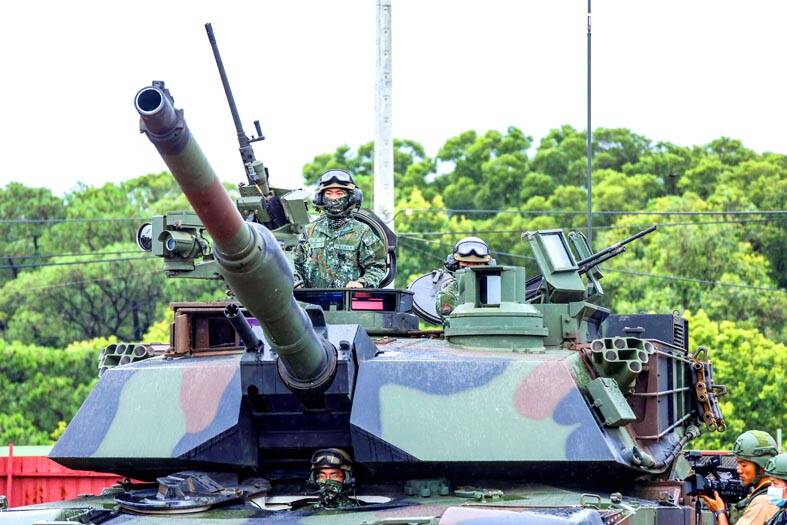Taiwan-US relations could be “significantly harmed” if the defense budget is blocked, a US academic said yesterday.
David Sacks, a Council of Foreign Relations (CFR) fellow for Asia studies, wrote in an article that if the defense budget is not increased as President William Lai (賴清德) proposed, Taiwan could be perceived as “not taking its defense seriously,” and a more vulnerable Taiwan would “embolden Chinese aggression.”
In February, Lai pledged to boost the nation’s defense budget to more than 3 percent of GDP — which followed demands by US President Donald Trump that Taiwan’s defense expenditure should account for 10 percent of GDP.

Photo: I-Hwa Cheng, AFP
After the largest portion of the recall movement, against 24 Chinese Nationalist Party (KMT) lawmakers, failed on Saturday, Chinese observers might assess that “Taiwanese voters favor a divided government as the best way to preserve the status quo,” and Beijing might intensify its coercion toward Taiwan, as well as attempts to undermine and isolate Lai, Sacks said.
However, Beijing could also remain patient and “wait him out,” he said.
Lai needs to prove to the electorate that he can work effectively with the opposition parties, he said, adding that Taiwan’s security might depend on the government’s ability to cooperate with the opposition KMT.
Hoover Institution research fellow Kharis Templeman said the outcome of last week’s recall elections demonstrates Taiwan is not as polarized as it might appear.
He said the results would not affect Taiwan-US relations, adding that maintaining trust is crucial for both countries’ leaders.
Separately, Thomas Shattuck, senior program manager of the University of Pennsylvania’s Perry World House, said the failure recall any of the KMT lawmakers on Saturday could make it more difficult for the ruling Democratic Progressive Party (DPP) to increase national defense spending, given its legislative minority.
The result would not change the “status quo” in bilateral relations between Taiwan and the US, and would not affect ties much, Shattuck said.
However, “the Trump administration will likely continue to pressure Taipei to spend more money on defense, which Lai will have a harder time doing without a DPP majority in the Legislative Yuan,” he said.
Raymond Kuo (郭泓均), a RAND Corp senior political scientist and director of its Taiwan Policy Initiative, said that ties between Taipei and Washington would be determined by how the opposition camp responds to government defense spending proposals.
With local elections slated for next year, some political observers — including Nathan Batto, an associate research fellow at the Institute of Political Science of Academia Sinica — believe the opposition camp could moderate their policies and rhetoric, Kuo said.
However, others think the opposition parties could go “scorched earth” to further obstruct the DPP government, he said.
In case of a failure to raise defense spending, Taiwan could pause certain military programs, such as its indigenous submarine project, to prioritize other areas that would enhance asymmetric defense, he said.
“Either way, this makes it harder for Taiwan as a whole to demonstrate to Washington that it is taking its security seriously, inevitably raising questions in the US about its posture and commitments,” Kuo said.
The DPP’s defense budget this year proposed a 6.6 percent increase in defense spending to NT$647 billion (US$21.8 billion), or about 2.5 percent of GDP.
The opposition only cut the budget by about 1.2 percent, but froze about NT$90 billion of pending actions by the government.

Taiwan is to commence mass production of the Tien Kung (天弓, “Sky Bow”) III, IV and V missiles by the second quarter of this year if the legislature approves the government’s NT$1.25 trillion (US$39.78 billion) special defense budget, an official said yesterday. Commenting on condition of anonymity, a defense official with knowledge of the matter said that the advanced systems are expected to provide crucial capabilities against ballistic and cruise missiles for the proposed “T-Dome,” an advanced, multi-layered air defense network. The Tien Kung III is an air defense missile with a maximum interception altitude of 35km. The Tien Kung IV and V

The disruption of 941 flights in and out of Taiwan due to China’s large-scale military exercises was no accident, but rather the result of a “quasi-blockade” used to simulate creating the air and sea routes needed for an amphibious landing, a military expert said. The disruptions occurred on Tuesday and lasted about 10 hours as China conducted live-fire drills in the Taiwan Strait. The Civil Aviation Administration (CAA) said the exercises affected 857 international flights and 84 domestic flights, affecting more than 100,000 travelers. Su Tzu-yun (蘇紫雲), a research fellow at the government-sponsored Institute for National Defense and Security Research, said the air

A strong continental cold air mass is to bring pollutants to Taiwan from tomorrow, the Ministry of Environment said today, as it issued an “orange” air quality alert for most of the country. All of Taiwan except for Hualien and Taitung counties is to be under an “orange” air quality alert tomorrow, indicating air quality that is unhealthy for sensitive groups. In China, areas from Shandong to Shanghai have been enveloped in haze since Saturday, the ministry said in a news release. Yesterday, hourly concentrations of PM2.5 in these areas ranged from 65 to 160 micrograms per cubic meter (mg/m³), and pollutants were

Taiwan’s armed forces have established response protocols for a wide range of sudden contingencies, including the “Wan Chun Plan” to protect the head of state, the Ministry of Defense (MND) said today. After US President Donald Trump on Saturday launched a series of airstrikes in Venezuela and kidnapped Venezuelan President Nicolas Maduro, concerns have been raised as to whether China would launch a similar “decapitation strike” on Taiwan. The armed forces regularly coordinate with relevant agencies and practice drills to ensure preparedness for a wide range of scenarios, Vice Minister of National Defense Hsu Szu-chien (徐斯儉) told reporters before a